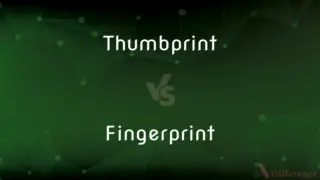Trustful vs. Trusty — What's the Difference?
By Tayyaba Rehman — Updated on September 24, 2023
"Trustful" means having or showing trust; "Trusty" refers to someone or something that is reliable.

Difference Between Trustful and Trusty
Table of Contents
ADVERTISEMENT
Key Differences
"Trustful" describes an attitude or disposition of trust. When a person is described as "Trustful," it implies that they tend to trust others easily or exhibit a trusting nature. In contrast, "Trusty" does not comment on the ability to trust others but rather on the reliability and dependability of the entity being described.
"Trustful" can often be used to describe individuals who have faith or confidence in people, situations, or outcomes. It might sometimes be seen as a vulnerability, as someone who is too "Trustful" might be susceptible to deceit. On the other hand, "Trusty" is a more straightforward adjective pointing to the trustworthiness or dependability of a person or thing. A "Trusty" tool, for instance, is one that consistently performs its function.
For clarity, consider interpersonal relationships. A "Trustful" person might readily believe what they are told and expect goodwill from others. In contrast, a "Trusty" friend is one who has proven their reliability and loyalty over time, being there when needed most.
In essence, while "Trustful" delves into the capacity or tendency to trust, "Trusty" zeroes in on the quality of being trusted. Both terms revolve around the theme of trust, but they approach it from distinct perspectives – one from the giver of trust and the other from the receiver.
Comparison Chart
Meaning
Exhibiting trust or faith.
Reliable or dependable.
ADVERTISEMENT
Part of Speech
Adjective.
Adjective.
Usage
Describes the one giving trust.
Describes the one being trusted.
Common Contexts
Trustful disposition, trustful eyes.
Trusty companion, trusty old tool.
Etymology
From "trust" with a suffix denoting a characteristic.
From "trust" with a suffix denoting state
Compare with Definitions
Trustful
Confident in others.
With a trustful glance, he handed over the documents.
Trusty
Steadfast in loyalty.
His trusty dog stood by his side.
Trustful
Having faith or assurance.
Her trustful demeanor was evident in every business deal.
Trusty
Dependable in nature.
He's my trusty assistant, always on point.
Trustful
Full of trust.
Sarah has a trustful nature, always seeing the best in people.
Trusty
Proven through experience.
This trusty method has worked for years.
Trustful
Expecting honesty and integrity.
She approached the situation with a trustful attitude.
Trusty
Earning the trust of others.
Max is a trusty ally in challenging times.
Trustful
Inclined to believe or confide readily; full of trust.
Trusty
Reliable over time.
My trusty old car has never let me down.
Trustful
Trusting; willing to trust.
Trusty
Meriting trust; trustworthy.
Trustful
(archaic) Trustworthy.
Trusty
A prison inmate granted certain privileges and benefits or accorded certain duties by virtue of having been recognized as trustworthy.
Trustful
Full of trust; trusting.
Trusty
A trusted person.
Trustful
Worthy of trust; faithful; trusty; trustworthy.
Trusty
Reliable or trustworthy.
She's been using the same trusty sewing machine since she started out, thirty long years ago.
Trustful
Inclined to believe or confide readily; full of trust;
Great brown eye, true and trustful
Trusty
A trusted person, especially a prisoner who has been granted special privileges.
Trustful
Ready to believe in the good of others.
Despite past betrayals, he remained trustful of new acquaintances.
Trusty
Admitting of being safely trusted; justly deserving confidence; fit to be confided in; trustworthy; reliable.
Your trusty and most valiant servitor.
Trusty
Hence, not liable to fail; strong; firm.
His trusty sword he called to his aid.
Trusty
Involving trust; as, a trusty business.
Trusty
Worthy of trust or belief;
A trustworthy report
An experienced and trustworthy traveling companion
Common Curiosities
Is a "Trusty" tool always old?
No, "Trusty" denotes reliability, not necessarily age.
Is every "Trusty" individual also "Trustful"?
No, being reliable (trusty) doesn't mean one readily trusts others (trustful).
Can an object be described as "Trustful"?
Typically, "Trustful" describes beings with emotions, but it can be used metaphorically.
Which describes a loyal dog: "Trustful" or "Trusty"?
"Trusty" would be more fitting for a loyal dog.
Can "Trustful" indicate vulnerability?
Yes, someone overly trustful might be more susceptible to deceit.
Can someone be both "Trustful" and "Trusty"?
Yes, someone can both exhibit trust and be reliable.
Which is more commonly used: "Trustful" or "Trusty"?
"Trusty" is more commonly used to describe reliable things or people.
Is "Trustful" synonymous with "naive"?
Not exactly. While a trustful person trusts easily, "naive" implies a lack of experience or judgment.
Would a dependable method be called "Trustful" or "Trusty"?
It would be called "Trusty."
Can a company be "Trusty"?
Yes, if it's known for its reliability and dependability.
Does a "Trustful" attitude always lead to disappointment?
Not always, but a trustful person may be more at risk for deceit.
Does "Trustful" always refer to people?
Primarily, but it can refer to anything exhibiting trust.
How can I improve my "Trustful" nature without becoming cynical?
Balancing trust with discernment and experience can help maintain trust without becoming overly vulnerable.
Is "Trusty" an old-fashioned term?
While it has older origins, it's still in use to describe reliability.
Can a "Trusty" person be deceitful?
"Trusty" implies reliability and trustworthiness, so typically, a trusty person would not be deceitful.
Share Your Discovery

Previous Comparison
Thumbprint vs. Fingerprint
Next Comparison
Random vs. HaphazardAuthor Spotlight
Written by
Tayyaba RehmanTayyaba Rehman is a distinguished writer, currently serving as a primary contributor to askdifference.com. As a researcher in semantics and etymology, Tayyaba's passion for the complexity of languages and their distinctions has found a perfect home on the platform. Tayyaba delves into the intricacies of language, distinguishing between commonly confused words and phrases, thereby providing clarity for readers worldwide.














































